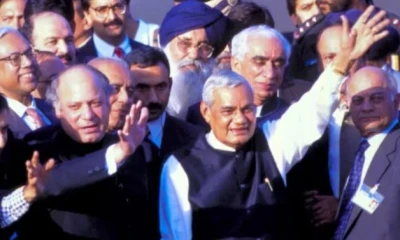In a significant revelation, former Pakistani Prime Minister Nawaz Sharif admitted Pakistan had violated the 1999 Lahore Declaration with Bharat, an agreement he signed with then Indian Prime Minister Atal Bihari Vajpayee. Sharif indirectly referred to the Kargil conflict initiated by General Pervez Musharraf, saying, “It was our fault.”
Speaking at a meeting of his party, the Pakistan Muslim League (N), Sharif recalled the sequence of events. “On May 28, 1998, Pakistan conducted five nuclear tests. Subsequently, Vajpayee Saheb visited Pakistan, and we signed an agreement. However, we violated that agreement… it was our fault,” Sharif stated.
The Lahore Declaration, signed on February 21, 1999, aimed to ensure peace and security between the neighbouring countries and encourage closer people-to-people ties. However, later that year, Pakistani forces infiltrated the Kargil district in Jammu and Kashmir, leading to the Kargil War. General Musharraf, the then four-star General of the Pakistan Army, orchestrated the secret infiltration in March 1999. The ensuing conflict, discovered by Indian forces, culminated in an Indian victory while Sharif was still in office.
A segment of Sharif’s speech, broadcasted by the State-owned Pakistan Television Corporation (PTV), quickly gained traction on social media.
As Pakistan commemorated the 26th anniversary of its first nuclear test, Sharif recalled, “President Bill Clinton had offered Pakistan USD 5 billion to deter us from conducting nuclear tests, but I refused. If someone like Imran Khan had been in my position, he would have accepted Clinton’s offer.”
Sharif also addressed his 2017 ousting from the Prime Minister’s office, labelling the charges against him as fabricated and alleging that Pakistan’s spy agency, the Inter-Services Intelligence (ISI), orchestrated his removal to elevate the now-imprisoned former Prime Minister Imran Khan to power.
“I urge Imran not to accuse us of being backed by the Army. He should disclose whether (former ISI chief) Gen Zahirul Islam discussed bringing the PTI or Pakistan Tehreek-e-Insaf into power,” Sharif remarked during his address at the PML(N)’s general council meeting.
Sharif further revealed that in 2014, he received a message from the ISI chief to resign from the Prime Minister’s office, and when he refused, he was threatened with severe consequences.
On Tuesday, Nawaz Sharif was re-elected “unopposed” as the President of the ruling PML-N party, marking a return to leadership six years after he was forced to step down following a Supreme Court ruling in the Panama Papers case.

















